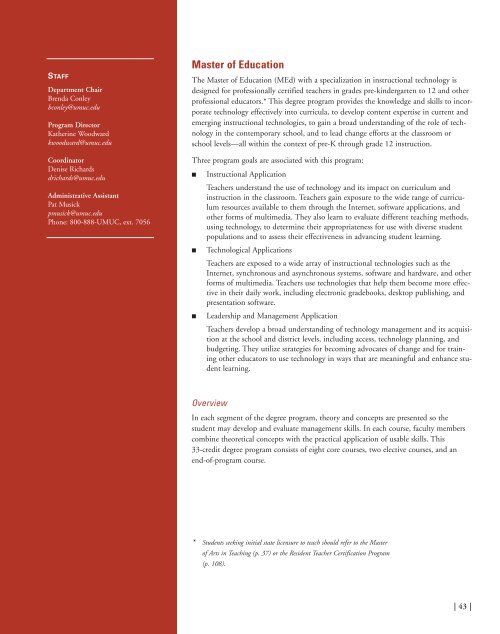A+B. Intro_SJ.1 - University of Maryland University College
A+B. Intro_SJ.1 - University of Maryland University College
A+B. Intro_SJ.1 - University of Maryland University College
You also want an ePaper? Increase the reach of your titles
YUMPU automatically turns print PDFs into web optimized ePapers that Google loves.
STAFF<br />
Department Chair<br />
Brenda Conley<br />
bconley@umuc.edu<br />
Program Director<br />
Katherine Woodward<br />
kwoodward@umuc.edu<br />
Coordinator<br />
Denise Richards<br />
drichards@umuc.edu<br />
Administrative Assistant<br />
Pat Musick<br />
pmusick@umuc.edu<br />
Phone: 800-888-UMUC, ext. 7056<br />
Master <strong>of</strong> Education<br />
The Master <strong>of</strong> Education (MEd) with a specialization in instructional technology is<br />
designed for pr<strong>of</strong>essionally certified teachers in grades pre-kindergarten to 12 and other<br />
pr<strong>of</strong>essional educators.* This degree program provides the knowledge and skills to incorporate<br />
technology effectively into curricula, to develop content expertise in current and<br />
emerging instructional technologies, to gain a broad understanding <strong>of</strong> the role <strong>of</strong> technology<br />
in the contemporary school, and to lead change efforts at the classroom or<br />
school levels—all within the context <strong>of</strong> pre-K through grade 12 instruction.<br />
Three program goals are associated with this program:<br />
■ Instructional Application<br />
Teachers understand the use <strong>of</strong> technology and its impact on curriculum and<br />
instruction in the classroom. Teachers gain exposure to the wide range <strong>of</strong> curriculum<br />
resources available to them through the Internet, s<strong>of</strong>tware applications, and<br />
other forms <strong>of</strong> multimedia. They also learn to evaluate different teaching methods,<br />
using technology, to determine their appropriateness for use with diverse student<br />
populations and to assess their effectiveness in advancing student learning.<br />
■ Technological Applications<br />
Teachers are exposed to a wide array <strong>of</strong> instructional technologies such as the<br />
Internet, synchronous and asynchronous systems, s<strong>of</strong>tware and hardware, and other<br />
forms <strong>of</strong> multimedia. Teachers use technologies that help them become more effective<br />
in their daily work, including electronic gradebooks, desktop publishing, and<br />
presentation s<strong>of</strong>tware.<br />
■ Leadership and Management Application<br />
Teachers develop a broad understanding <strong>of</strong> technology management and its acquisition<br />
at the school and district levels, including access, technology planning, and<br />
budgeting. They utilize strategies for becoming advocates <strong>of</strong> change and for training<br />
other educators to use technology in ways that are meaningful and enhance student<br />
learning.<br />
Overview<br />
In each segment <strong>of</strong> the degree program, theory and concepts are presented so the<br />
student may develop and evaluate management skills. In each course, faculty members<br />
combine theoretical concepts with the practical application <strong>of</strong> usable skills. This<br />
33-credit degree program consists <strong>of</strong> eight core courses, two elective courses, and an<br />
end-<strong>of</strong>-program course.<br />
* Students seeking initial state licensure to teach should refer to the Master<br />
<strong>of</strong> Arts in Teaching (p. 37) or the Resident Teacher Certification Program<br />
(p. 108).<br />
| 43 |

















